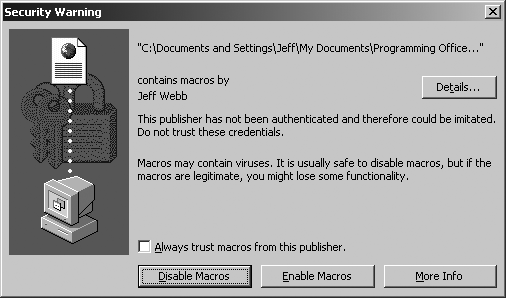I encourage a guided, trial-and-error approach to learning how to program. This is mainly because I don’t think anyone can remember all the facts and information you need to know without having some way to apply that information in a practical way. Also, I think most of us are impatient by nature and want to get started as soon as possible.
However, I don’t want you to confuse this approach with disorganization or sloppiness. Either of those bad habits will make your programming experience difficult and frustrating. The following list is a collection of good habits that will pay off as you learn and develop your career:
- Declare all your variables
Adding
Option Explicitto the top of each class or module helps make sure you don’t accidentally misspell a variable name and cause a subtle error that can be hard to locate.- Type carefully
Many names in Excel, such as worksheet names or named ranges, can’t be checked through
Option Explicitand misspelling one of those in code can lead to similarly hard-to-locate errors.- Use short, descriptive names
There are different conventions for naming variables and procedures but the crux of all of them is to be short and descriptive. Be careful not to be too descriptive though. I try to keep variable names down to a few characters and I tend to use whole words when naming procedures.
-
Avoid
ActiveSheetandSelection I know Excel records code this way, but it is much better to get a worksheet or range by name if possible. Relying on which worksheet or range is selected makes it harder to debug and reuse your code. The exception to this guideline is when you really want to act on the
ActiveSheetorSelection, such as when you are creating general tools that work on any worksheet or range.- Try to think clearly
For complicated tasks, it can help to write out what you want to do on a pad of paper, then try to do those steps in Excel with macro recording on. Often it helps to break a task up into several different steps and make those steps procedures that you can call from one central procedure.
- Rely on friends
There are a lot of programmers in the Excel community and they communicate through a number of very active newsgroups. Those are great places to look for answers and to find samples.
- Copy others
I don’t mean you should plagiarize copyright-protected work, but it’s OK to copy most code snippets, and it’s good practice to follow the coding style of others if you find it elegant.
- Share with others
This is the other side of relying on friends and copying others. Don’t be afraid of feedback, either.
- Take a break
The best programmers I know lead balanced lives. You’ll be surprised how many problems seem to solve themselves once you relax.
Get Programming Excel with VBA and .NET now with the O’Reilly learning platform.
O’Reilly members experience books, live events, courses curated by job role, and more from O’Reilly and nearly 200 top publishers.


